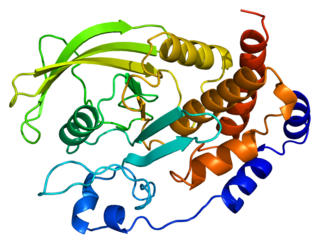Related Research Articles
A protein phosphatase is a phosphatase enzyme that removes a phosphate group from the phosphorylated amino acid residue of its substrate protein. Protein phosphorylation is one of the most common forms of reversible protein posttranslational modification (PTM), with up to 30% of all proteins being phosphorylated at any given time. Protein kinases (PKs) are the effectors of phosphorylation and catalyse the transfer of a γ-phosphate from ATP to specific amino acids on proteins. Several hundred PKs exist in mammals and are classified into distinct super-families. Proteins are phosphorylated predominantly on Ser, Thr and Tyr residues, which account for 79.3, 16.9 and 3.8% respectively of the phosphoproteome, at least in mammals. In contrast, protein phosphatases (PPs) are the primary effectors of dephosphorylation and can be grouped into three main classes based on sequence, structure and catalytic function. The largest class of PPs is the phosphoprotein phosphatase (PPP) family comprising PP1, PP2A, PP2B, PP4, PP5, PP6 and PP7, and the protein phosphatase Mg2+- or Mn2+-dependent (PPM) family, composed primarily of PP2C. The protein Tyr phosphatase (PTP) super-family forms the second group, and the aspartate-based protein phosphatases the third. The protein pseudophosphatases form part of the larger phosphatase family, and in most cases are thought to be catalytically inert, instead functioning as phosphate-binding proteins, integrators of signalling or subcellular traps. Examples of membrane-spanning protein phosphatases containing both active (phosphatase) and inactive (pseudophosphatase) domains linked in tandem are known, conceptually similar to the kinase and pseudokinase domain polypeptide structure of the JAK pseudokinases. A complete comparative analysis of human phosphatases and pseudophosphatases has been completed by Manning and colleagues, forming a companion piece to the ground-breaking analysis of the human kinome, which encodes the complete set of ~536 human protein kinases.

In biochemistry, a phosphatase is an enzyme that uses water to cleave a phosphoric acid monoester into a phosphate ion and an alcohol. Because a phosphatase enzyme catalyzes the hydrolysis of its substrate, it is a subcategory of hydrolases. Phosphatase enzymes are essential to many biological functions, because phosphorylation and dephosphorylation serve diverse roles in cellular regulation and signaling. Whereas phosphatases remove phosphate groups from molecules, kinases catalyze the transfer of phosphate groups to molecules from ATP. Together, kinases and phosphatases direct a form of post-translational modification that is essential to the cell's regulatory network.

The Medical Research Council (MRC) Laboratory of Molecular Biology (LMB) is a research institute in Cambridge, England, involved in the revolution in molecular biology which occurred in the 1950–60s. Since then it has remained a major medical research laboratory at the forefront of scientific discovery, dedicated to improving the understanding of key biological processes at atomic, molecular and cellular levels using multidisciplinary methods, with a focus on using this knowledge to address key issues in human health.
Sir Philip Cohen is a British researcher, academic and Royal Medal winner based at the Medical Research Council Protein Phosphorylation and Ubiquitylation Unit, School of Life Sciences at the University of Dundee.
David Moore Glover is a British geneticist and Research Professor of Biology and Biological Engineering at the California Institute of Technology. He served as Balfour Professor of Genetics at the University of Cambridge, a Wellcome Trust investigator in the Department of Genetics at the University of Cambridge, and Fellow of Fitzwilliam College, Cambridge. He serves as the first editor-in-chief of the open-access journal Open Biology published by the Royal Society.

Tyrosine-protein phosphatase non-receptor type 1 also known as protein-tyrosine phosphatase 1B (PTP1B) is an enzyme that is the founding member of the protein tyrosine phosphatase (PTP) family. In humans it is encoded by the PTPN1 gene. PTP1B is a negative regulator of the insulin signaling pathway and is considered a promising potential therapeutic target, in particular for treatment of type 2 diabetes. It has also been implicated in the development of breast cancer and has been explored as a potential therapeutic target in that avenue as well.

Receptor-type tyrosine-protein phosphatase mu is an enzyme that in humans is encoded by the PTPRM gene.
Kun-Liang Guan, is a Chinese and American biochemist. He won the MacArthur Award in 1998.
Dario Renato Alessi is a French-born British biochemist, Director of the Medical Research Council Protein Phosphorylation and Ubiquitylation Unit and Professor of Signal Transduction, at the School of Life Sciences, University of Dundee.
David Barford is a British medical researcher and structural biologist at the MRC Laboratory of Molecular Biology Cambridge, UK.

Anthony Rex Hunter is a British-American biologist who is a professor of biology at the Salk Institute for Biological Studies and the University of California San Diego. His research publications list his name as Tony Hunter.

Ramanujan Shankar Hegde is a group leader at the Medical Research Council (MRC) Laboratory of Molecular Biology (LMB).
Ghanshyam Swarup is an Indian molecular biologist, a J. C. Bose National Fellow and the head of the Ghanshyam Swarup Research Group of the Centre for Cellular and Molecular Biology. He is known for his studies on glaucoma and the discovery of protein tyrosine phosphatase, a new protein influencing the regulation of cell proliferation. Swarup is an elected fellow of the Indian Academy of Sciences, the Indian National Science Academy and the National Academy of Sciences, India. The Council of Scientific and Industrial Research, the apex agency of the Government of India for scientific research, awarded him the Shanti Swarup Bhatnagar Prize for Science and Technology, one of the highest Indian science awards, in 1996, for his contributions to biological sciences.
Alexandru Radu Aricescu, known by his middle name, is a Romanian-British molecular neuroscientist based at the MRC Laboratory of Molecular Biology, Cambridge; Prior to 2017, he worked at the Wellcome Trust Centre for Human Genetics at the University of Oxford; in 2016 the University awarded him the title of Professor of Molecular Neuroscience.

Roger Lee Williams is a structural biologist and group leader at the Medical Research Council (MRC) Laboratory of Molecular Biology. His group studies the form and flexibility of protein complexes that associate with and modify lipid cell membranes. His work concerns the biochemistry, structures and dynamics of these key enzyme complexes.
Anne Bertolotti is a French biochemist and cell biologist who works as Programme Leader at the MRC Laboratory of Molecular Biology in Cambridge, UK. In 2022 she was appointed Head of the MRC LMB's Neurobiology Division. She is known for her research into the cellular defences against misfolded proteins and the mechanisms underlying their deposition, the molecular problem causative of neurodegenerative diseases.
Pauline Johnson is an English immunologist and microbiologist at the University of British Columbia. Her research focuses on innate and adaptive immune mechanisms — in particular, the mobility of proteins in membranes, lymphocyte cell surface molecules, T cell signalling, leukocyte adhesion, and macrophages in lung inflammation.
Mirela Delibegovic is a British pharmacologist/biochemist who is Dean for Industrial Engagement in Research & Knowledge Transfer and Director of Aberdeen Cardiovascular and Diabetes Centre. She holds a Personal Chair in Diabetes Physiology and Signalling at the Institute of Medical Sciences at the University of Aberdeen. During the COVID-19 pandemic, Delibegovic used artificial intelligence to develop technologies that would allow mass-screening for coronavirus disease 2019.
Amy M. Barrios is an American medicinal chemist working as a professor of Medicinal Chemistry and the Associate Dean for Postdoctoral Affairs for the University of Utah. Barrios' research lab focuses on developing probes to study protein tyrosine phosphatase (PTP) activity and regulation.

Alexei Kharitonenkov is a Russian-American researcher best known for his discoveries of endocrine functions of Fibroblast Growth Factor 21 (FGF21) and its prospects in developing novel therapies for metabolic diseases. He is also known for his landmark identification of the Signal-Regulatory family of proteins (SIRPs), (SIRPs), and their corresponding protein-tyrosine phosphatases, which helped unveil the molecular machinery of immune self-recognition and their potential for the development of drugs to fight cancer.
References
- ↑ Tonks, Nicholas K. (2006). "Protein tyrosine phosphatases: from genes, to function, to disease". Nature Reviews Molecular Cell Biology. 7 (11): 833–846. doi:10.1038/nrm2039. PMID 17057753. S2CID 1302726.
- ↑ "MRC Protein Phosphorylation Unit :: Research :: Philip Cohen :: Profiles for Past Lab Members". Ppu.mrc.ac.uk. Retrieved 5 May 2016.
- ↑ "Royal Society - Fellows 1660-2007" (PDF). Royal Society. Retrieved 3 March 2012.